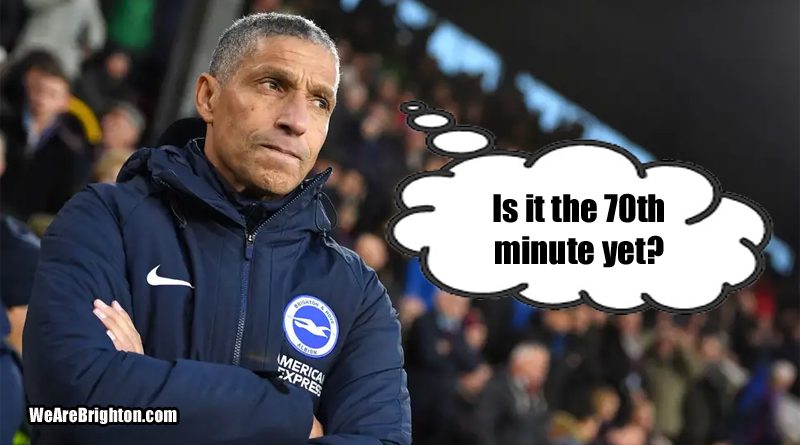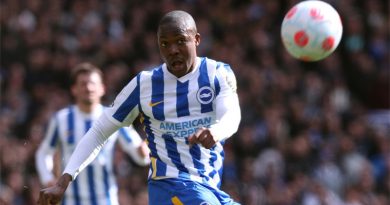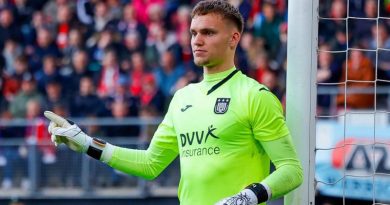What effect have Chris Hughton’s subs had in the Premier League?
Plenty has been made since Brighton and Hove Albion’s promotion to the Premier League about Chris Hughton’s approach to substitutions.
The Albion manager is routinely criticised for making changes too late, being reactive rather than proactive and for his reluctance to change shape or tactics by always making like-for-like substitutions.
Given that it was two of Hughton’s changes who helped win the Albion’s recent game with Huddersfield Town with Jose Izuqierdo playing a part in teeing up Florin Andone’s header for the only goal, we’ve decided it was as good a time as ever to take a look at the facts behind Hughton’s substitutions and the impact they’ve had on the Seagulls spell in the top flight so far.
It turns out that he has made 186 subs in the Premier League so far, and here’s the breakdown of when they’ve occurred, why they’ve happened and most intriguingly of all, the effect they’ve had.
Substitutions after the 70th minute
Hughton’s phobia of making changes before the 70th minute has become of the most frequently used sticks with which to beat the Albion manager, but how true actually is it? 136 of his 186 changes have come after 70 minutes have been played, accounting for 74% of substitutions.
Substitutions between the 60th and 69th minutes
Hughton’s second most popular time to make changes is between the hour mark and the 70th minute, with 33 substitutions occurring then, representing around 18% of his total.
Substitutions between half time and the 59th minute
Very rarely will Hughton make a change before an hour has been played, with only eight subs in 66 games taking place between half time and the 59th minutes. Of those, two were forced by bookings with Bruno in the 0-0 draw at Watford and Ezequiel Schelotto in the 2-1 home win over Arsenal both being withdrawn before they were sent off. Schelotto was hauled at half time after the disastrous experiment that was starting him on the right wing away at Huddersfield last season while both Jose Izquiero and Jurgen Locadia were sacrificed at the break in the defeats at West Bromwich Albion and Crystal Palace as Hughton sought formation changes to try and overcome terrible first half performances. So far this season, the Albion have made three changes in the first 15 minutes of the second half and they’ve all come in the past three league games – Solly March being withdrawn in the defeat to Burnley, Pascal Gross limping off at Leicester City and of course Andone coming on to net the winner at the weekend.
Enforced first half changes
First half changes for tactical reasons are rare, but we have seen them happen before from opposition managers, such as when Swansea City made a double first-half change in their 4-1 defeat at the Amex last February. It is something that Hughton is yet to do in the Premier League however, with all nine of his subs made before half time being due to injuries or dismissals. Izzy Brown was the sole victim last season in the opening day defeat to Manchester City while in this campaign, Bruno, Lewis Dunk, Dale Stephens and Glenn Murray twice have all come off through injury. Gross and Solly March were both sacrificed after first half red cards in the home game against Palace and away at Cardiff City respectively.
Like-for-like substitutions
A huge 88% of Hughton’s substitutions have been like-for-like changes which involved no formation adjustment – 162 out of 186, a statistic that does little to dispel the feeling that the Albion boss is a safety first manager who’d rather not make radical changes.
Adjustments from the bench
Just 24 of Hughton’s top flight substitutions have resulted in a player replacing somebody who was featuring in a different position. In our first few months in the top flight, the Albion manager developed a liking for hauling Gross in place of a winger late on in games, a situation which occurred away at Leicester, Watford, Plucky Little Bournemouth and Huddersfield. As a result, Gross is the most substituted Brighton player in the Premier League, often for Beram Kayal when we’re attempting to hold on for a win or for a striker when going for victory.
Formation changes
In the Albion’s first four months of Premier League football, we didn’t see one genuine formation change brought about by Hughton’s substitutions. That can be partly explained by the lack of striking options as the obvious adjustment would be to adopt 4-4-2 when chasing a game but given that we only had Murray and Tomer Hemed as fit and available senior strikers from August until January, Hughton’s hands were tied somewhat in that regard. The first time he switched formations mid game was once Sam Baldock regained fitness in the defeat away at West Brom in January, ending with 4-4-2 as Baldock replaced Gross after starting with 4-5-1. Locadia then came on for Kayal away at Everton, Baldock for Kayal at home to Leicester and Ulloa for Gross at Palace. This season, Loacadia and Andone have come on a combined five times to join Murray in attack.
Proactive formation changes
It’s rare that Hughton makes a formation change to try and win a game. Of his 24 mid game adjustments, 17 have come when the Albion were already behind and he is reacting to the situation rather than trying to shape it. The rare exceptions have largely come this season and usually involve Bissouma replacing a winger when we’re already in the lead, as has happened at Newcastle and home to Wolves. Hughton also infamously withdrew Murray in favour of playing the final 10 minutes at home to Everton with no striker and Izzy Brown operating as a false nine which backfired spectacularly when the Toffees equalised with a last minute penalty.
Goals from the bench
Of Hughton’s 186 changes, just five substitutes have been involved in goals in 66 Premier League games. Locadia was the only player to score from the bench last season when netting the final goal in the 4-1 rout of Swansea on his league debut following his £14m move from PSV Eindhoven and Izquierdo’s assist at home to Everton remains the only direct assist from a substitute so far. This season the bench has contributed slightly more, helped of course by that brilliant victory over Palace. Leon Balogun scored with his first touch after being introduced as part of the enforced tactical adjustment caused by Shane Duffy’s red card and Andone netted the goal of the season after taking the place of the injured Murray. The Romainian’s header at the weekend was his second and Brighton’s fifth contributed from the bench, meaning that just 6% of Hughton’s subs have been directly involved in goals in the Premier League.





unfortunately things are back firing. The team lacks quality from midfield, there is no passion and with 5 in the middle we still seem to only win 30% of loose balls cleared from opponents.
We cant rely on one up front 15 yds from our nearest players, even messy would struggle to hold the ball up and wait 5 mins for assistance. As for dead ball situations although we have scored a few there must be half a dozen corner moves I can think of. As for tactics we have been found out a long time ago, down the flanks where we are fortunate to clear the 1st defender. I thought this ball was lighter and bends and swerves and dips all sorts of magical things that one would read in something like Alice in Wonderland. Chris this is where you are fella. The Brighton fans are polite to a point and the sharpener is turning.